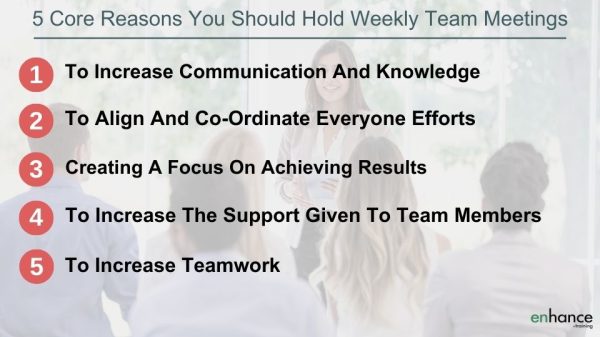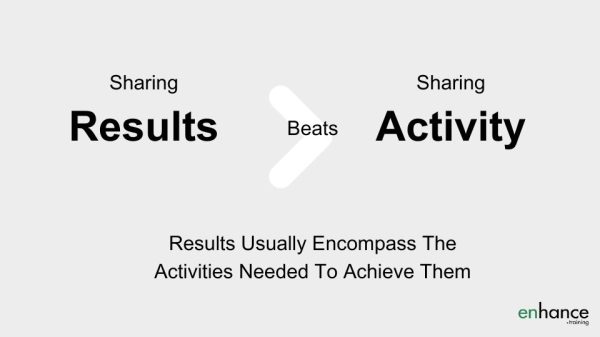Run Great Weekly Team Meetings – How to Run Staff Meetings Effectively

Run great weekly team meetings and staff will want to attend, the team meeting will be useful to everyone, and holding the weekly team meeting will actually improve team performance over time compared to not holding them.
Most weekly team meetings are a long way from this – with bored attendees, feeling like their time is being wasted and wishing they could get back to their work.
Great weekly team meetings are essential for communicating priorities, focusing the team’s efforts in the most important areas for that week and month, and for creating ownership and accountability throughout the team.
Great weekly team meetings connect the team members together, co-ordinate staff efforts, build teamwork and direct help and support where it is most needed.
Run great weekly team meetings – how to run staff meetings effectively
- 5 key reasons why You Hold Weekly Team Meetings
- 3 simple rules for making Weekly Staff Meetings Effective.
- 4 Essential Agenda Items for Each Weekly Team Meeting to get team members focused on delivering results
The best weekly team meetings are those where everyone is involved, contributing and discussing. Avoid meetings where the leader is the only person who really speaks, where what is shared is stale information most already know and where staff learn little or nothing. I explain exactly how to use 4 essential agenda items to avoid all these common team meeting problems.
Watch on YouTube
Listen on Podcast
A great meeting has a clear purpose. Everyone attending the meeting knows why they are attending and what is expected from them during the meeting.
5 core reasons you should hold weekly team meetings:
- To increase communication and knowledge throughout the team
- To align and co-ordinate everyone efforts to maximise the results you get from your team
- So everyone on the team is focused on achieving results rather than doing activity
- To increase the support given to team members so the team achieves more
- Lastly to increase teamwork
Each of these is super important for improving team performance. I have turnaround the performance of multiple teams and won prizes for best team at company and national level with different teams. I use weekly team meeting as a core foundation for communicating and focusing the efforts of the team. I look to create action and commitment from team members as a result of the meeting, not just to increase their knowledge of what is happening.

3 simple rules for making Weekly Staff Meetings as effective as possible
I have found these to be great guidelines for pretty much any meeting and suggest you implement immediately if you are not already using all of them.
- Ask everyone who attends the meeting to participate. The best way to achieve this is to assign a different task or responsibility to each attendee, each of which contributes to the groups goals and then ask for updates on progress and next steps. This builds responsibility and accountability. If they are not able to contribute, they don’t need to be in the meeting.
- Keep the meeting under 1 hour and aim for 30 minutes or less. This is absolutely possible – just keep everyone focused on the essentials.
- Everyone should leave the meeting with at least one action. Each action should be aligned to and in support of achieving the team goals.
Weekly team meetings should help achieve results. If they are not, change how you use your weekly team meetings.

Weekly Team Meeting Agenda Items
- Share results achieved
- Set team and individual goals for the week
- Share challenges and organise help
- Celebrate wins and success
Going through each in more detail
sharing results achieved – First agenda item for weekly team meetings
Give every person in your team a numerical goal to achieve that captures the most important output from their day job. Always ensure individual goals support and help the team overall achieve its goals – i.e. there is good goal alignment.
Sharing weekly results are much better than sharing activities undertaken because results usually encompass the activities needed to achieve them.
Get each team member to report progress by putting their results onto a white board or into a KPI table which everyone can see. By creating visibility you are encouraging accountability and ownership. Using graphs or tables with several weeks of information makes the trend of results clear. Make sure everyone can see the results achieved throughout the meeting.
By openly sharing everyone’s progress towards targets, you are setting expectations between peers. No-one wants to be bottom or have falling performance. Most people would hate to let colleagues down. By openly and regularly sharing individual performance, you will get improved performance throughout the team. Go a step further and foster some healthy competition and gamify reporting progress within the team.
Lastly, share the overall team results or progress towards key goals and the company’s performance at least on a monthly basis. Context helps individuals make better more aligned decisions on a daily and weekly basis, which in turn further increases team performance.
Set team and individual goals for the week – second agenda item for weekly team meetings
There are two parts to this agenda item. The first part is setting goals for the team to specifically focus on and deliver in the next week. Create 1-3 weekly team goals so that everyone will contribute to at least one of them.
You should then link the weekly team meeting goals into the longer term team goals and direction. Explain why hitting the weekly team goals will help achieve the monthly or quarterly team goals. Firstly, linking keeps consistency in the weekly goals so they don’t jump all over the place. Consistency means the team will deliver more in the same timeframe compared to inconsistent goals. Secondly, linking reaffirms why the weekly team meeting goals are important in achieving longer term goals. Everyone wants to feel what they are doing is valuable and important.
The second part of this agenda item is to ask each team member to tell the rest of the team what actions they are going to take and what results they going to deliver to help achieve team goals before the next weekly team meeting. Capture the goals for each person on a white board or write down and circulate. This works best when you tell the team members in advance what the weekly team goals are. Ask other team members to challenge weak or easy to achieve individual goals. This encourages the team members to hold each other to account.
Every team member should leave the meeting with 1-3 key goals they must deliver before the next weekly team meeting.

Share challenges and organise help – The third agenda item
As a leader, emphasise that achieving weekly team goals are what counts and everyone is expected to help wherever they can, so the team wins overall. Ask who would like your help during the week to help achieve their individual goals. Encourage team members to ask colleagues for help to overcome their specific challenges. Helping individual team members means helping to achieve team goals quicker, which helps everyone.
During the week provide the help you have offered and make sure team members offering help have provided it. Keep the emphasis on getting help to team members to reach team goals quicker.
Don’t use the weekly team meeting to solve problems. Organise a separate meeting with the right staff to solve that specific problem. Do use the weekly team meeting to organise help for any team member requesting help. To encourage others to ask for help, be the first to ask for help yourself. Make asking for and offering help an expected and essential part of teamwork, rather than a sign of weakness.

celebrate wins & successes – The fourth agenda item for weekly team meetings
To end the meeting on a very positive note, ask team members to spend a few minutes sharing:
- Successes achieved since the last meeting
- Thankyous for help provided by colleagues
- Praise for good actions, decisions, behaviours and results
Praising others and celebrating successes is a great way to finish the meeting, encourage praise within the team, and highlight the successes achieved as a team and by individuals in the team.
In summary
Weekly team meetings should be quick, straight to the point and help the team improve their overall performance by increasing communication, co-ordination, support and teamwork.
Implement the 3 simple rules for weekly team meetings being:
- Everyone contributes
- Keep the meeting quick
- Everyone leaves with at least one action
Then use 4 straight forward agenda items to increase accountability, visibility and ownership across your team. The agenda items are:
- Share results achieved
- Set team and individual goals for the week
- Share challenges and organise help
- Celebrate wins and success
If you have any questions, on “Run Great Weekly Team Meetings / How to Run Staff Meetings Effectively”, please email me at support@enhance.training and I will get back to you.
[More tips on running great team meetings – click here]





